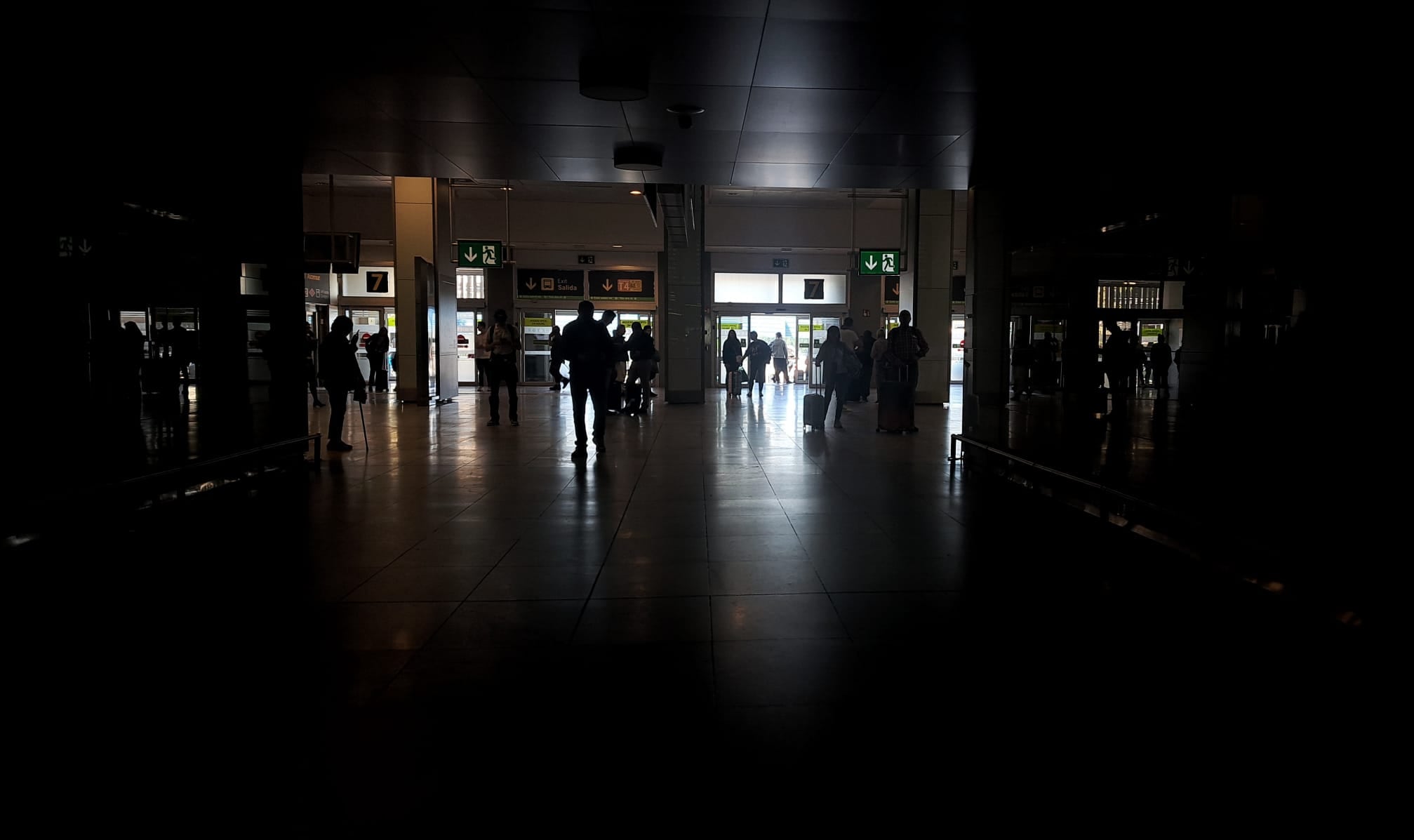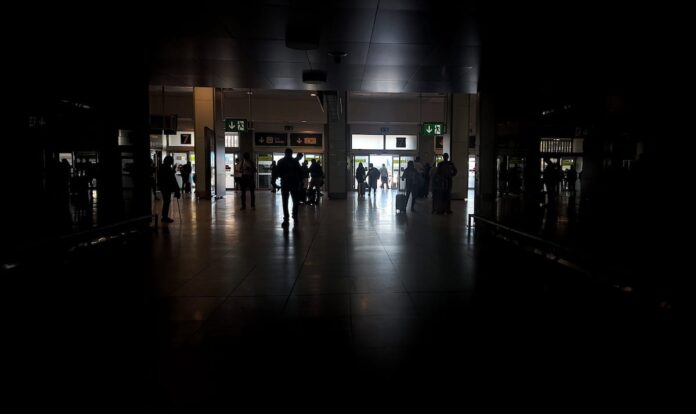
The worst power blackout in Spain’s recent history has affected, since noon local time, millions of citizens throughout the country as well as Portugal. The power cut has paralyzed the normal functioning of infrastructures, telecommunications, roads, train stations, airports, stores, and buildings. Hospitals have not been impacted as they are using generators. There is still no official explanation for the massive blackout. Authorities have not ruled out a cyberattack as both the Spanish and Portuguese governments investigate the cause. As of now, there is no “conclusive information” on what happened, said Spain’s Prime Minister Pedro Sánchez in an address from the Moncloa Palace.
“The causes are still being studied. It is better not to speculate,” said Sánchez, who added that no possibility has been ruled out. The prime minister asked citizens to reduce travel, to be informed only through official channels and to make a responsible use of their cell phones, with short calls and only those that are necessary. “It is a difficult day,” he admitted, “of tremendous impact and importance.”
Electricity service is gradually being restored in areas of Catalonia, Aragon, the Basque Country, Galicia, Asturias, Navarre, Castile and Leon, Extremadura and Andalusia, according to Red Eléctrica, the public company that operates the national electricity grid in Spain. The grid operator is working with the main energy companies in the country, and is relying on interconnections with France through Catalonia and Morocco through Andalusia to restore supply in areas in the extreme south and north of the country. Sánchez thanked France and Morocco for their collaboration.
Eduardo Prieto, Director of Operations Services at Red Eléctrica, stated that full service recovery will take between six and ten hours, which, if confirmed, would mean that power would be restored across the country between nine in the evening and one in the morning.
The outage has suddenly set Spain back to the 19th century. Traffic lights out of service, traffic jams forming across the country, pedestrians wandering around cities without public transportation, desperate families trying to communicate with their loved ones, passengers left stranded without trains or flights, canceled medical appointments, rescues underway in subway stations and elevators, lines forming outside small shops due to supermarket closures… These were some of the scenes left by the unprecedented event on Monday.
The urgency of the incident has led the authorities to make it the only topic on the agenda. Sánchez held a meeting at the Control Center of Red Eléctrica, where Deputy Prime Minister Sara Aagesen and several other ministers were also present. The National Security Council also met. Sánchez announced that three autonomous communities — Andalusia, Extremadura, and Madrid — have formally requested to declare a level three civil protection emergency in their respective territories. “The government has accepted their request and is going to assume the management, and will do the same with others that want to,” Sánchez said.
Red Eléctrica has also refrained from suggesting possible causes of the massive blackout: “There is no evidence regarding the cause of the incident, and we cannot speculate about its origin; everything will be analyzed in full detail,” stated Prieto. Likewise, the Vice President of the European Commission, Teresa Ribera, did not suggest a cause and noted that, after contacting Spanish and Portuguese authorities, “there are no indications that it was deliberately caused.” From Brussels, the President of the European Commission, Ursula von der Leyen, expressed her support for the Spanish authorities. The Prime Minister of Portugal, Luís Montenegro, told the press that the source of the failure lies within the Spanish grid, although the exact causes are still unknown.
Citizens from all Spanish regions and from Portugal reported widespread power outages shortly after noon. According to major Spanish electric companies consulted by EL PAÍS, no explanation has yet been provided for the blackouts. The Adif railway network experienced voltage losses, leading to the suspension of train traffic across the country. Renfe announced through its social media accounts that there has been no train movement or departures from stations since 12:30. Various airlines reported disruptions at airports such as Madrid-Barajas and Barcelona-El Prat as power supply is being restored. Air traffic controllers have reported traffic regulations or reductions at the two major hubs on the peninsula: Madrid-Barajas and Lisbon. Confusion reigns among airlines and travelers.
The blackout is also affecting telecommunications. There are widespread problems making phone calls, and the WhatsApp messaging service is operating at reduced capacity. Major telecommunications companies like Telefónica and Masorange are investigating the situation and working to restore service as quickly as possible. The internet can work for a few hours without electricity, but not for much longer. While data centers are protected by their own backup generators, the network relies on intermediate systems that have a shorter autonomy.
Non-urgent medical interventions are suspended
Spain’s healthcare system is currently functioning, as hospitals are equipped with backup generators for power outages, which can keep essential equipment such as ventilators, heart monitors, and other vital medical devices running for hours. Although some facilities in certain areas may experience power loss, it should not affect critical care. A spokesperson for the Gregorio Marañón Hospital in Madrid explained that an emergency committee has been activated to make decisions depending on how long the electrical failure lasts, but emphasized that patient care is fully covered. At the 12 de Octubre Hospital in Madrid, where emergency systems have also been activated and power is available, a spokesperson indicated that surgeries already underway have continued, while those that had not yet started have been suspended for the time being, except for urgent cases. The Hospital del Mar in Barcelona is operating normally.
Due to the widespread blackout on the mainland, Spain’s Directorate-General for Traffic is asking the public to avoid using their cars except in cases of extreme necessity, due to the risk of accidents. “The lack of electricity supply prevents the operation of traffic lights and signage panels.” In some areas, police officers are manually directing traffic.
In Madrid, the Metro service has been suspended due to “external causes” related to the power outage, according to a message posted on X. Likewise, the Madrid Cercanías commuter rail network is out of service due to the lack of electricity. Additionally, 150 elevator incidents have been reported in the city, according to the mayor, José Luis Martínez-Almeida.
Factory lines come to a halt
In addition to infrastructure, commerce, and telecommunications, large industries are also struggling to continue their operations. Car manufacturers Seat and Ford have stopped their production lines. As this newspaper has been able to confirm, the Ford Almussafes car plant is currently without power and with the production lines completely stopped. “The workers are scared, they don’t know what has happened,” says a company spokesman. Truck manufacturer Iveco, which has factories in Madrid and Valladolid, has also stopped machines while waiting for the power to come back on.
The Spanish stock exchange (BME) confirms that it is operating normally and that there have been no interruptions in stock market operations. Sources from the National Securities Market Commission (CNMV) indicate that “market infrastructures are functioning normally,” although it is possible that some financial institutions are experiencing connectivity issues that could prevent their clients from operating as usual.
Panorama in neighboring countries
In Portugal, the blackout is also widespread. At the Lisbon airport, thousands of passengers are left in a state of confusion following the power system failure. There has been no official explanation yet from the Portuguese government regarding the failure in the country’s electrical grid, which is also affecting the telecommunications network. Red Eléctrica Nacional, the company that manages distribution in the country, confirmed that this is a widespread failure across the entire territory and that they are investigating the causes. Minister Manuel Castro Almeida stated on the RTP television channel that a cyberattack cannot be ruled out, and that it may be impacting several European countries.
The massive power outage in Spain and Portugal, according to some French media, has only mildly impacted areas near the French border. Cities like Perpignan, according to the newspaper L’Indépendant, have experienced some brief power cuts. Beyond these areas, the country has not faced further disruptions.
